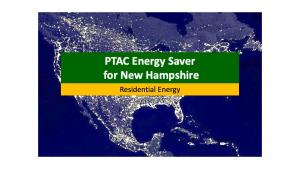- 1 read

Our GREENandSAVE Team is pleased to share information like this about sustainability solution providers. If you would like to submit information on your company, please contact us.
TIME TO ACT: Save 20% or more on HVAC. It’s important now more than ever for a sustainable future!
Optimizing PTAC units with a “smart” device is a fast, easy, and cost-effective way to achieve Residential HVAC Energy Savings. A Packaged Terminal Air Conditioner is a type of self-contained heating and air conditioning system commonly found in: Hotels, Motels, Senior Housing Facilities, Hospitals, Condominiums, Apartment Buildings, and Add-on Rooms & Sunrooms.
Business owners and homeowners face increasing challenges with energy costs to save energy and money in New Hampshire PTAC Energy Saver offers an Adaptive Climate Controller (ACC). It is a proven HVAC energy saving device that quickly installs on PTAC units. There are many companies that claim to produce energy savings, but the ACC device is multi-panted and proven over many years. Plus, it has extensive validation tests by organizations such as:
- ConEdison, Manhattan Plaza New York City
- Environmental Test Laboratory, Ohio
- EME Consulting Engineers (Third Party), Sponsored by NYSERDA, New York
- State University of New York, Oneonta, NY
- Tim Garrison (Third Party Testing)
- McQuay Cooling Tests
- Purdue University Tests (Phoenix)
- ConEdison Tests by ERS
Typically, when an HVAC system turns off, shortly after, the blower fan motor turns off. The ACC reprograms the blower fan not to shut off but to throttle back the rpm airflow to an exceptionally low speed, quiescent level airflow or “idle speed”. This allows for a gentle but continuous air movement into the building that helps keep equilibrium of climate conditions in the occupied space and saved energy.
PTAC Energy Saver can help you navigate the complexity of HVAC energy saving choices: CONTACT PTAC Energy Saver
Here is an example of some Residential HVAC Energy Saving info for New Hampshire:
High heat stresses air conditioners, energy grid
MANCHESTER, N.H. —
Fans and air conditioners were working overtime Monday in New Hampshire as temperatures reached the 90s, and the struggle to stay cool is putting a big demand on the energy grid.
Utility companies are warning customers that the cost of electricity is at its highest right now. But experts said little changes can yield big savings on utility bills and limit the need for HVAC services.
Steve Labbe, of Paradigm Plumbing, Heating & AC said he's running seven crews straight out right now, and if you need service, you'll have to pay overtime rates. He said the better strategy is to be smart about your thermostat.
"A lot of people freeze up these units," he said. "They go, 'we are going to put it at 60.' What happens is the units can't handle that, and they freeze up. So, we will come to a unit that is all frozen up."
Labbe said if you see frost on the refrigerant line outside your house on the coil, you need to let the unit thaw before turning it back on.
"You are not going to get any cooler if you put it to 65. That's a big thing," he said.
He said air conditioners should be set no lower than 68 degrees to avoid freezing. Utility officials said turning the thermostat up a few degrees more can lead to significant savings.
"It's not what you want to hear, but keep that AC set as warm as you possibly can," said William Hinkle, of Eversource. "You can save 1-3% on your energy costs for every degree higher you have that AC set."
The message is to be safe but smart about your energy use when it's this hot.
"On the hottest days of the summer, electricity actually costs more than it does at night or on cooler days of the summer," said Alec O'Meara, of Unitil.
The U.S. Department of Energy recommends keeping thermostats set at 78 degrees during the summer and 68 degrees in the winter to balance comfort and savings.
HVAC companies also warn that there are supply chain delays for air conditioner parts. They're advising their customers to put in a window unit, because they can't guarantee when the parts will be in for house units.

